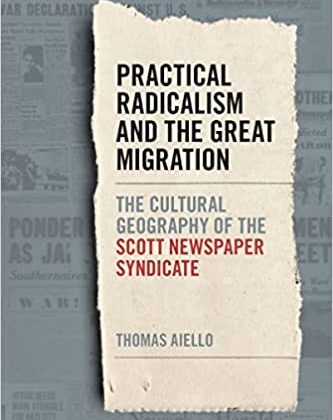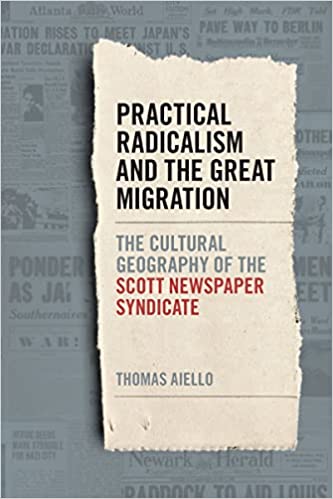

Thomas Aiello is Professor of History, Africana Studies, and Anthrozoology at Valdosta State University. This interview is based on his new book, Practical Radicalism and the Great Migration: The Cultural Geography of the Scott Newspaper Syndicate (University of Georgia Press, 2023).
JF: What led you to write Practical Radicalism and the Great Migration?
TA: Practical Radicalism is essentially a sequel to a book called The Grapevine of the Black South, an examination of the Scott Newspaper Syndicate emanating from Atlanta from the late 1920s to the early 1950s. I realized after publishing that book that there was more to say about how Black newspaper syndication worked in that era, and how a southern newspaper chain was able to create a network of hundreds of newspapers throughout the country, following the route of the Great Migration. It called for a cultural geography that explained how a newspaper, the Atlanta Daily World, could modify its editorial position to meet different challenges in different parts of the country with very different expectations than the audience for its flagship newspaper.
JF: In 2 sentences, what is the argument of Practical Radicalism and the Great Migration?
TA: In order to simultaneously draw in readers and help shape their perspectives, the Scott Newspaper Syndicate, emanating from the South but with a presence throughout the country, engaged in what could be called a practical radicalism, arguing on the margins of racial bigotry in order to secure slow but progressive change for its various constituencies. Those constituencies changed in time and space, through three decades and across the country as newspapers followed migrants out the South.
JF: Why do we need to read Practical Radicalism and the Great Migration?
TA: When we talk about the history of the Black press, we tend to almost uniformly talk about the larger papers in the North: the Chicago Defender, the New York Amsterdam News, the Pittsburgh Courier, the Afro-American, and others. But the bulk of the Black population in the first half of the twentieth century was southern, and when those southerners went north, they took their news with them in the form of syndication emanating from Atlanta. If, as cultural and media studies tells us, we can’t understand a people’s mindset without understanding the ephemera they digest, then historians of Black America cannot simply focus on large northern newspapers to gauge African American attitudes in the generation before the classical civil rights movement. We need to understand the hundreds of smaller newspapers that were local to individuals moving north during the Great Migration and the process of syndication emanating from Atlanta that helped frame the fight against segregation.
JF: Why and when did you become an American historian?
TA: I am a white southerner, who came to American history in college after leaving my hometown and realizing, after getting a view of it from a distance, how racist that hometown was. I wanted to understand that phenomenon, how bigotries can hide in plain sight and affect a population. I wanted to be able to contextualize how race worked in society, and how culture and intellectual production helped shape racial constructions in the South and in the country as a whole. I finished my first PhD in 2007 and have been writing about these subjects ever since.
JF: What is your next project?
TA: Fitting that bent to contextualize that I mentioned previously, I have an edited collection coming soon on the history of police brutality in America. It brings together almost forty of the leading scholars in the field of history, criminology, and sociology to trace the history of how we got to the point where we are today. It was a project forged in the wake of the George Floyd murder and the protests that followed, and will hopefully help people understand how we got to the dangerous point we have reached today. It is called The Routledge History of Police Brutality in America, and it should be out in the next couple of months.
JF: Thanks, Thomas!